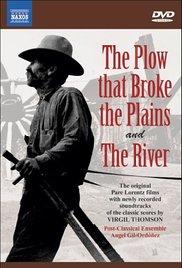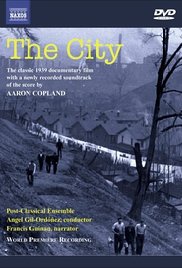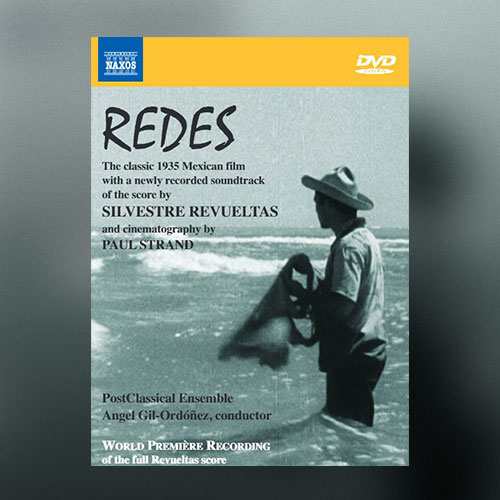With our newly released Redes DVD, PostClassical Ensemble completes its Naxos quartet of classic 1930s films with freshly recorded soundtracks.
The scores for these four films – the others are The Plow that Broke the Plains, The River, and The City – are among the most distinguished ever composed for film. The composers are Virgil Thomson, Aaron Copland, and Silvestre Revueltas. What is more remarkable, all four films are music-driven to a degree rarely approachable today.
While sound films, The Plow, The River, and The City are famous documentaries shot without sound. This is because in the thirties sound equipment was not readily portable in the field. No ambient sound was added. Rather, the three soundtracks comprise formidably original symphonic music and sonorous blank verse narration, sans dialogue. The result is a unique but short-lived high-art genre.
Redes was mainly shot without sound. Most of the ambient sound and dialogue were added later. But the film’s iconic sequences were without exception shot without sound, and no dialogue or ambient sound were ever added.
All four films feature powerful and powerfully autonomous music tracks. The music does not merely mimic the action. Nor does it merely drive the narrative trajectory. Rather, it acquires a rare degree of autonomy.
When at the end of The Plow a sad parade of cars escapes failed farms victimized by a legendary drought, Thomson supplies an ironic habanera. Copland’s “Sunday Traffic” sequence, in The City, juxtaposes a massive traffic jam with an ebullient accelerating march.
For the child’s funeral in Redes, Revueltas composes a self-sufficient dirge based on a minor-key leitmotif he triumphantly reprises in the major at the film’s close – a signature of redemption for the oppressed fishermen whose plight the film exposes.
Significantly, these are not films to which music was added after they were shot and edited. Pare Lorentz recut The Plow upon receiving Thomson’s startlingly original score. For The River, Thomson was part of the creative team from the start. The same was true of Copland with regard to The City.
In the case of Redes, Revueltas began work on his music before seeing any rushes. It’s not surprising that this unsettled Paul Strand, the film’s legendary cinematographer. Revueltas also had the final say after Strand and the film’s directors – Fred Zinnemann and Emilio Gomez Muriel – were no longer around. It would be hard to imagine a film project that more empowered its composer.
It bears mentioning that the four films influenced one another. Pare Lorentz directed both The Plow and The River, and wrote a script outline for The City. Paul Strand shot Redes and was one of four cinematographers for The Plow. Willard Van Dyke took part in The River and The City both.
Aaron Copland reviewed Redes for The New York Times – and we can infer that both Redes and the two Lorentz films inspired his work on The City. Copland was then off to Hollywood, where he scored five films and won an Academy Award. But none of those film scores nearly attains the caliber or impact of his music for The City.
In fact, after 1940 — with the full advent of sound and of more mobile outdoor sound equipment – little comparable to The Plow, The River, The City, or Redes was ever again likely to materialize. I can think of rare exceptions, such as Ken Russell’s amazing 1983 film version of Holst’s The Planets, in which not a single image is planetary. But that, too, is a silent film with music – an anomaly.
Naxos plans eventually to package PostClassical Ensemble’s DVDs as a single boxed set – memorializing a landmark effort in the history of music and the moving image.




Leave a Reply